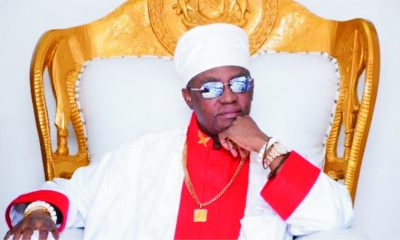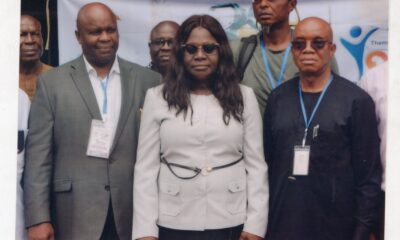Politics
Problems That Led To Civil War Still Linger – Ekweremadu
The Deputy President of the Senate, Chief Ike Ekweremadu, has expressed regret that the factors that led to the Nigeria Civil War are still existing among Nigerians, 41 years after the end of the war that lingered for three years.
Ekweremadu who made his feelings known last Saturday in Enugu while answering questions from reporters during his condolence visit to the family of the late Biafran leader, Chief Emeka Odumegwu Ojukwu, who died on November 26, this year in a London hospital.
His words: “You see as we speak today, the things that gave rise to the Civil War are still with us and that is why many years after the Civil War, we had the Ife/Modakeke crisis and the problem we still have in Plateau State. Even in Anambra state, we have Aguleri/Umuleri crisis”.
Chief Ekweremadu further said: ”So, these crises are still there. What gave rise to the civil war was massacre of the people who are Nigerians living within Nigeria. You see that such thing is still going on. It is still that same hatred of one another that gave rise to the civil war. We still have them here and there and those problems are yet to be addressed.”
On the late Biafran leader, the Deputy Senate President said Ojukwu was a phenomenon, stressing that each person should do his best to give him a befitting burial.
“Ikemba as a person came before his time. Ikemba lived ahead of his time. He died ahead of his time because his vision, his views are yet to be realized. And I believe surely his views will be realized. And it is at that time Nigerians will begin to realize that Ikemba was a man who saw tomorrow,” he further stressed.
According to him, the best that could be done for the late statesman was for Nigerians to sit down and dialogue to address the unresolved issues to enable Nigerians live as a nation, pointing out that ”As at now we are all managing to survive as one country. It is important to address these problems because they are with us and I do not believe that they are insurmountable”.
He said: “It is possible we find an arrangement to accommodate everybody in Nigeria so that people can live peacefully wherever they find themselves and be able to earn their living without confrontation. For me, Ikemba is a phenomenon and everybody should do his best to give him a befitting burial. Ikemba, people knew him as a humble and focused man. The man inspite of the wealth of his father abandoned the luxury of life and joined the army which at that period was meant for children of the less privileged.”
Ekweremadu also said: “Also in spite of his education, he was prepared to serve Nigeria. And when it became necessary for him to fight, he lived almost like an animal. He did not know what will happen to him in the next moment. What a better sacrifice will a man do than that?
“He loved his people. So what we have seen since his death shows that his people also loved him. I believe that the people of South East and indeed Nigerians will give him a befitting burial”, he further stressed.
Politics
INEC Denies Registering New Political Parties

The Independent National Electoral Commission (INEC) says it has not registered any new political parties.
The commission gave the clarification in a statement on its X (formerly Twitter) handle last Wednesday.
It described the purported report circulated by some online social media platforms on the registration of two new political parties by INEC as fake.
“The attention of INEC has been drawn to a fake report making the rounds about the registration of two new political parties, namely “Independent Democrats (ID)” and “Peoples Democratic Movement (PDM)”.
“For the avoidance of doubt, the commission has not yet registered any new party. The current number of registered political parties in Nigeria is 19 and nothing has been added,” it stated.
The commission recalled that both ID and PDM were registered as political parties in August 2013.
INEC further recalled that the two were deregistered in February 2020 in accordance with Section 225A of the 1999 Constitution of the Federal Republic of Nigeria.
The commission, therefore, urged the public to disregard the said report.
Politics
You Weren’t Elected To Bury People, Tinubu Tells Alia

President Bola Tinubu has asked Governor Hyacinth Alia to work more for peace and development of Benue State, saying he was elected to govern, not to bury people.
The President said this while addressing stakeholders at the Government House, Markudi, last Wednesday.
He also called on the governor to set up a peace committee to address some of the issues in the state.
The meeting included the Secretary to the Government of the Federation (SGF), George Akume, traditional rulers, and former governors of the state.
The governors of Kwara, Imo, Kogi, Plateau, Ondo, and Nasarawa states also attended the meeting.
“Let us meet again in Abuja. Let’s fashion out a framework for lasting peace. I am ready to invest in that peace. I assure you, we will find peace. We will convert this tragedy into prosperity,” he said.
President Tinubu urged Governor Alia to allocate land for ranching and directed the Minister of Agriculture and Food Security to follow up.
“I wanted to come here to commission projects, to reassure you of hope and prosperity, not to see gloomy faces. But peace is vital to development.
“The value of human life is greater than that of a cow. We were elected to govern, not to bury people”, he stressed.
He charged Governor Alia on working with the Federal Government to restore peace.
“Governor Alia, you were elected under the progressive banner to ensure peace, stability, and progress. You are not elected to bury people or comfort widows and orphans. We will work with you to achieve that peace. You must also work with us”, he said.
In his remarks, Governor Alia appealed to the Federal Government to establish a Special Intervention Fund for communities affected by repeated violent attacks across the state.
“Your Excellency, while we continue to mourn our losses and rebuild from the ashes of pain, we humbly urge the Federal Government to consider establishing a special intervention fund for communities affected by these incessant attacks in Benue State,” he said.
Governor Alia said the fund would support the rehabilitation of displaced persons, reconstruction of destroyed homes and infrastructure, and the restoration of livelihoods, especially for farmers.
He reiterated his support for establishing state police as a lasting solution to insecurity.
The governor pledged his administration’s full commitment to building a safe, stable, prosperous Benue State.
Also speaking at the meeting, the Chairman of the Benue State Traditional Rulers Council, Tor Tiv, Orchivirigh, Prof. James Ayatse, praised President Tinubu for being the first sitting President to personally visit victims in the hospital in the wake of such a tragedy.
He thanked the President for appointing notable Benue indigenes into key positions, including the Secretary to the Government of the Federation and the Minister of Water Resources and Sanitation, Professor Joseph Utsev, while expressing hope that more appointments would follow.
Politics
Gowon Explains Why Aburi Accord Failed
Former Head of State, Gen. Yakubu Gowon (ret’d), says the Aburi accord collapsed because Chukwuemeka Ojukwu wanted regional governors to control military zones.
Gen. Gowon was Nigeria’s military ruler from 1966 until 1975 when he was deposed in a bloodless coup while Ojukwu was military governor of the then Eastern Region in that span.
In a live television interview recently, Gen. Gowon narrated what transpired after the agreement was reached in Aburi, a town in Ghana.
The meeting that led to the accord took place from January 4 to 5, 1967, with delegates from both sides of the divide making inputs.
The goal was to resolve the political impasse threatening the country’s unity.
The point of the agreement was that each region should be responsible for its own affairs.
During the meeting, delegates arrived at certain resolutions on control and structure of the military. However, the exact agreement reached was the subject of controversy.
The failure of the Aburi accord culminated in Nigeria’s civil war, which lasted from July 6, 1967, to January 15, 1970.
Speaking on what transpired after the agreement, Gen. Gowon said the resolutions should have been discussed further and finalised.
The ex-military leader said he took ill after arriving in Nigeria from Aburi and that Ojukwu went on to make unauthorised statements about the accord.
Gen. Gowon said he did not know where Ojukwu got his version of the agreement from.
“We just went there (Aburi), as far as we were concerned, to meet as officers and then agree to get back home and resolve the problem at home. That was my understanding. But that was not his (Ojukwu) understanding,” he said.
Gen. Gowon said Ojukwu declined the invitation, citing safety concerns.
“I don’t know what accord he (Ojukwu) was reading because he came to the meeting with prepared papers of things he wanted. And, of course, we discussed them one by one, greed on some and disagreed on some.
“For example, to give one of the major issues, we said that the military would be zoned, but the control… He wanted those zones to be commanded by the governor.
“When you have a military zone in the north, it would be commanded by the governor of the military in the north, the military zone in the east would be commanded by him. Of course, we did not agree with that one”, Gen. Gowon added.
Ojukwu died on November 26, 2011 at the age of 78.
-
News4 days ago
Military Kills 6,260 Terrorists, Rescues 5,365 Civilians In 2 Years – DHQ
-

 News4 days ago
News4 days agoBenin Monarch Receives 119 Stolen Artefacts From Netherlands
-
Sports5 days ago
Winners Emerge At Lagos Cricket League
-
Business4 days ago
Nigeria, Others Listed On UN’s Worsening Hunger Hotspots
-
Business4 days ago
Create Diving Schools, Expert Urges FG
-

 News4 days ago
News4 days agoFoundation Tasks Parents, Families On Moral Rectitude
-
News4 days ago
COAS Hails 542 New Military Retirees Over Selfless Service
-

 Politics4 days ago
Politics4 days agoYou Weren’t Elected To Bury People, Tinubu Tells Alia

